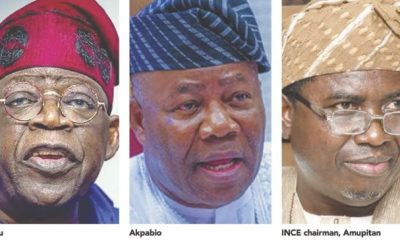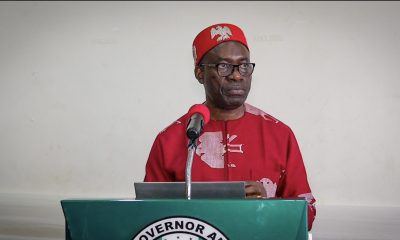Latest
The Many failed promises of President Bola Tinubu: 18 months of unfulfilled expectations
Published
1 year agoon

Since taking office on May 29, 2023, President Bola Ahmed Tinubu’s administration has faced growing scrutiny over a series of unmet promises that have left many Nigerians disillusioned.
With his campaign heavily focused on economic reform, infrastructure development, and security enhancement, the president’s failure to deliver on key pledges has raised questions about his governance and commitment to the electorate.
Economic Aspirations and Reality
One of Tinubu’s major campaign promises was to revitalize Nigeria’s struggling economy, particularly in the face of soaring inflation and rising unemployment. He vowed to create millions of jobs through investment in local industries and agriculture.
However, two years into his presidency, the economy continues to face significant challenges. The inflation rate has surged to 32.2% in August 2024
affecting the purchasing power of citizens. Many industries remain stagnant, and unemployment rates show little sign of improvement.
In May 2023, President Tinubu’s administration announced the float of the naira, moving away from the previous fixed exchange rate system managed by the Central Bank of Nigeria (CBN).
However, the immediate impact of floating the naira was a sharp depreciation of the currency. Before the float, the official exchange rate was around N420 to the US dollar, while the black-market rate hovered around N600.
Following the policy shift, the naira quickly depreciated. As of October 7, 2024, the naira is hovering at approximately N1,650 to the US dollar at both the official Nigerian Autonomous Foreign Exchange Market (NAFEX) and the parallel market.
The promise to lift millions out of poverty has also fallen flat. Reports indicate that the number of Nigerians living below the poverty line has increased, exacerbated by economic policies that critics argue have not effectively addressed the underlying issues.
READ ALSO: Lamido tackle Tinubu’s vacation amidst economic hardship in Nigeria
Despite these challenges, Tinubu’s administration has repeatedly emphasized its commitment to economic reform, often citing ongoing initiatives that have yet to produce tangible results.
Fuel Subsidy Removal and Economic Impact
One of the most controversial actions taken by Tinubu’s government was the removal of the longstanding fuel subsidy, which he argued was necessary for economic stability and to free up funds for infrastructure development.
While he assured Nigerians that the subsidy removal would lead to improvements in public services and economic growth, the immediate aftermath saw fuel prices soar, with reports indicating increases of over 200%.
This sudden rise has placed immense financial strain on ordinary citizens, leading to widespread protests and unrest.
Critics of the subsidy removal have accused the administration of failing to prepare adequately for the transition, leaving many Nigerians struggling to afford basic transportation and goods.
The promise of an improved public transport system and alternative arrangements has yet to materialize, further fueling discontent among the populace.
Security Concerns and Promises of Safety
Security was another cornerstone of Tinubu’s campaign, with promises to tackle the increasing wave of insecurity, particularly from insurgents, bandits, and separatists.
He pledged to equip the military and law enforcement agencies better and implement strategies to curb violent crime. However, Nigeria continues to grapple with significant security challenges, including a resurgence of Boko Haram attacks in the northeast and rising banditry in the northwest.
READ ALSO: Ndume urges Tinubu to hire mercenaries after deadly Borno attack
Despite Tinubu’s assurances, high-profile kidnappings and attacks have persisted, raising doubts about the effectiveness of his security policies. Many Nigerians feel increasingly unsafe in their communities, and the president’s inability to stem the tide of violence has led to criticism of his leadership and management of security affairs.
Infrastructure Development Promises
Tinubu promised extensive investments in infrastructure, including roads, railways, and electricity, to spur economic growth and improve living conditions. While there have been some announcements regarding infrastructure projects, tangible progress has been slow.
Many of the roads and bridges in critical states remain in disrepair, and power supply continues to be erratic, with millions of Nigerians facing daily power outages.
The president’s administration has faced accusations of inefficiency and lack of transparency regarding funding for these infrastructure projects, with many citizens questioning whether the government is genuinely committed to addressing these critical issues.
Political Division and Accountability
Moreover, Tinubu’s leadership has not been without political controversy. His administration has faced accusations of nepotism and favoritism, particularly concerning key appointments and contracts.
READ ALSO: Ndume urges Tinubu to hire mercenaries after deadly Borno attack
Critics argue that his reliance on a close-knit circle of allies has hindered broader inclusivity in governance.
Calls for accountability have grown louder, with many citizens urging the president to uphold his promises of good governance and transparency. The National Assembly, which Tinubu’s party dominates, has also faced scrutiny for its role in holding the executive accountable for its actions.
With economic hardship, security concerns, and stagnant infrastructure development, the president faces mounting pressure to deliver on his commitments.
It remains to be seen whether Tinubu will address these pressing issues effectively or if his administration will be remembered for the many promises that remain unfulfilled.
The road ahead is fraught with challenges, and the expectations of the Nigerian people weigh heavily on his administration as it seeks to navigate a path toward recovery and reform.
Trending

 Comments and Issues1 week ago
Comments and Issues1 week agoThe politics and optics of electronic transmission of election results

 Comments and Issues1 week ago
Comments and Issues1 week agoCombating Political Apathy in Nigeria, Reigniting the Nation’s Democratic Spirit

 Health7 days ago
Health7 days agoDOJ files expose Gates–Epstein ties in pre-COVID pandemic planning, funding

 Comments and Issues1 week ago
Comments and Issues1 week agoSenate’s coup against Nigeria’s democracy

 Education1 week ago
Education1 week agoSit-at-Home: Anambra suspends nine headteachers over pupils’ low attendance

 Football7 days ago
Football7 days agoPremier League defends Leeds goal after Chelsea draw controversy

 Aviation1 week ago
Aviation1 week agoAeroland Travels losses US$333,350.53 to Lufthansa Airlines petitions IGP, Interpol

 News4 days ago
News4 days agoProfessor Sanni tasks local, state gov’t over replication of tax reform act at Eko Club Business Luncheon

